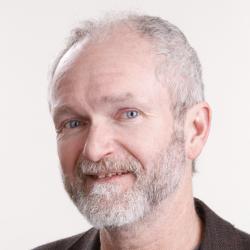First to quell the rumors: It is not true that local reporters assigned to cover the Katko-Maffei congressional race have begun begging their editors to transfer them to Liberia to report on the Ebola outbreak. That did not happen, but if you had to endure up close and on a daily basis the mind numbing, childish chatter that has passed for a campaign this season, you might well understand the allure of Monrovia.
What has happened is that The Post-Standard, county health professionals and Lorraine Branham, dean of the S.I. Newhouse School of Public Communications at Syracuse University, became part of the Ebola story without ever having to leave home.
It came about when Newhouse rescinded an invitation to the Washington Post’s Michel duCille, a rock-star photojournalist who was recently covering the epidemic. His long-planned visit, says Branham, was a coaching stint and had nothing to do with Ebola. When she told him to stay away, he called her out, and the two story lines merged.
Journalists by and large echoed duCille’s outrage, noting that the man was asymptomatic and monitoring himself, following public health guidelines for anyone working in proximity to the virus. Our local thrice-weekly backed the dean, and in doing so (Oct. 17) took a cheap, gratuitous shot at duCille, a three-time Pulitzer winner, suggesting that “if he is so keen on teaching future media professionals this weekend, we suggest he dial them up on Skype.”
Around the country and the world, commentators attacked SU’s call, finding irony and outrage that an institution dedicated to teaching students to ferret out facts and report them (Newhouse) was pandering to a growing public hysteria, some of it fanned by – yup – the media.
The public overwhelmingly backed the dean, and she says that parents and students are calling to thank her for keeping them safe. Branham came out with some unusually candid public statements, expressing confidence that duCille wouldn’t make her sick but that she had to take into account the feelings of others.
“I had to deal with parents, with students, and for me to say, ‘There, there, no reason to be concerned … People are afraid,” she says.
Asked if her action might feed those fears, she said flatly, “That’s your job as journalists, not my job as dean.” This was all about her students and their concerns, and not all of them, she notes, have an interest in covering risky topics.
When students began to voice their concerns, one of the people Branham called was Dr. Quoc Nguyen, the medical director of Onondaga County’s Health Department. Nguyen is the local Tom Frieden, facing the task of explaining complex public health matters to a public urgently demanding simple answers.
He gave SU the best information he had, which was largely what the CDC was saying: that a patient should self-monitor for 21 days after possible exposure. Statistically, 95 percent of cases incubate in that period, though one study puts the number at 88 percent. In public health terms, says Nguyen, even 88 percent certainty is a good thing. (His role was to provide data to SU but he did not, as the Post editorial states, “counsel” them to disinvite duCille. He respects the decision, he says, but it was made on the Hill.)
Like a general fighting the last war, Nguyen says that the only data he can work with is from previous epidemics.
“The book on this one is not written yet,” he says.
But there is this, which he finds reassuring:
“The family of Thomas Duncan, (the lone patient to have died of Ebola diagnosed while in the U.S.), shared his apartment, and we know he had vomiting in that apartment, and they are all free of disease. We know it is difficult to spread the disease.”
One hundred percent assurance? Anyone who has been to the doctor knows it just doesn’t work that way.
***
While some of us are not willing to tolerate even imaginary risks, others calmly head toward the flames. Beth Mason is a nurse from Oneida who Nov. 8 will return to Togo, a West African nation of nearly 7 million people.
She works at a hospital that she describes as “pretty good” by standards in the developing world. “We provide sheets,” she says.
Her last year-long stint at Biblical Baptist Hospital involved treating people with such things as malaria, snakebite and “lots of motorcycle accidents.”
There have been no reported cases of Ebola in Togo, which is two countries removed from the outbreak, but the public health infrastructure there is as weak as that in Liberia and Sierra Leone.
For her efforts, she will be rewarded with three weeks of quarantine when she returns just before Christmas. About the reaction at home, she thinks that “Ebola is scary, but people are more panicked than they need to be. It will be interesting to see if Ebola is scary there (in Togo). They don’t have TV.”
***
The teachable moment on Ebola that duCille feels was missed might not have passed forever. Branham is trying to gather journalists and public health officials “to revisit” the coverage of Ebola and see what can be learned. The panel is tentatively scheduled for Nov. 13. Michel duCille has been invited to participate, via Skype, from Liberia, where he plans to be, once again covering the country hardest hit by the virus.




